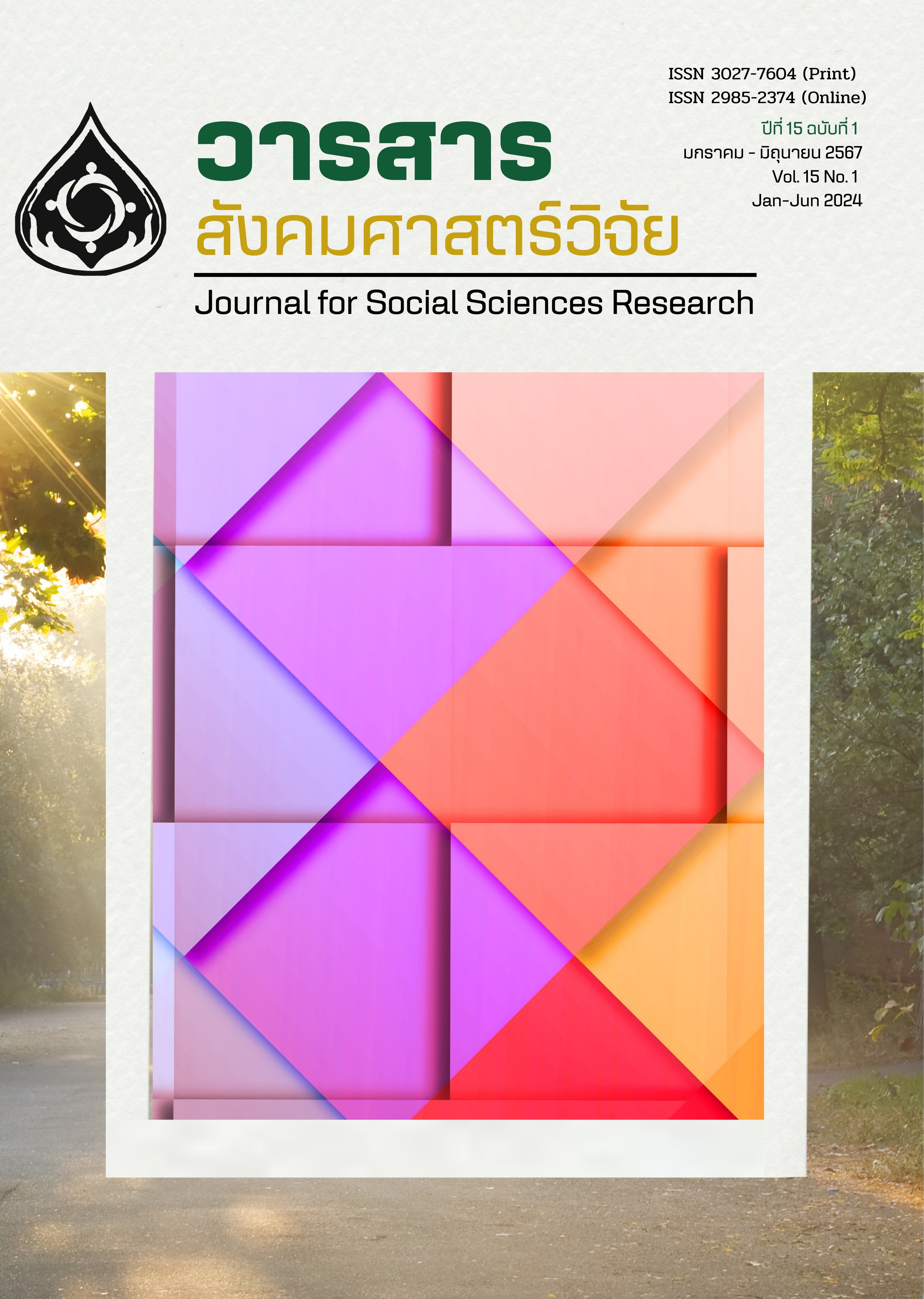ACADEMIC LEADERSHIP AFFECTING DESIRABLE CHARACTERISTICS OF STUDENTS OF SPECIAL EDUCATION CENTERS IN THE NETWORK FOR EFFICIENCY PROMOTION OF EDUCATIONAL MANAGEMENT IN REGIONAL SPECIAL EDUCATION CENTER 7
Main Article Content
Abstract
The objectives of this research were to 1) study the level of the academic leadership of education administrators; 2) study the level of the student’s desired characteristics; 3) study the relationship between the academic leadership of education administrators and the student’s desired characteristics; and 4) create a prediction equation for academic leadership of education administrators that can predict the student’s desired characteristics. The sample group used in the research included 336 teachers working at special education centers in the Network for Efficiency Promotion of Educational Management in Regional Special Education Center 7, under the Special Education Bureau in the academic year 2023. The research tool was a rating scale questionnaire with a consistency index between 0.60-1.00 and reliability values for the independent variable at the level of 0.97 and the dependent variable at the level of 0.96. Statistics used in the research include percentages, means, standard deviations, Pearson’s correlation coefficient, and stepwise multiple regression analysis. The results showed that:
- Overall and specific aspects, the academic leadership of education administrators was at a high level. The aspect with the highest average was the arrangement of environment to facilitate learning, following by development of teacher professional advancement, while the aspect with the lowest average was curriculum and teaching management.
- Overall the student’s desired characteristics was at a high level. When considering each aspect, 6 aspects were found at a high level, namely, honesty, discipline, eagerness to learn, self-sufficient living, loving Thainess, and public mind. Two aspects were found at a medium level, that is, love of nation, religion, and king, and commitment to work.
- The academic leadership of education administrators had a positive relationship with all aspects of the student's desired characteristics with a statistical significance level of .04 and a correlation coefficient between 0.26-0.37.
- The academic leadership of education administrators in the aspects of curriculum and teaching management, arrangement of environment to facilitate learning, development of teacher professional advancement, and measurement and evaluation of student progress can predict the students’ desired characteristics at the percentage of 22.40.
Article Details

This work is licensed under a Creative Commons Attribution-NonCommercial-NoDerivatives 4.0 International License.
บทความที่ได้รับการตีพิมพ์เป็นลิขสิทธิ์ของมหาวิทยาลัยราชภัฏนครปฐม
เนื้อหาของแต่ละบทความเป็นทัศนะของผู้เขียน ซึ่งที่ปรึกษา บรรณาธิการ กองบรรณาธิการ และคณะกรรมการบริหารวารสารไม่จำเป็นต้องเห็นด้วย หรือร่วมรับผิดชอบใดๆ
References
จิตตินันท์ ดีหลาย. (2561). การศึกษาคุณลักษณะอันพึงประสงค์ของนักเรียนโรงเรียนไสวนันทวิทย์จังหวัดตราด. การค้นคว้าอิสระศึกษาศาสตรมหาบัณฑิต สาขาวิชาการบริหารการศึกษา บัณฑิตวิทยาลัย มหาวิทยาลัยเกริก.
ชุดาภร มูลมณี. (2565). ภาวะผู้นำทางวิชาการของผู้บริหารสถานศึกษา โรงเรียนขยายโอกาสทางการศึกษา สังกัดสำนักงานเขตพื้นที่การศึกษาประถมศึกษาเชียงราย เขต 2. การศึกษาค้นคว้าด้วยตนเองการศึกษามหาบัณฑิต สาขาวิชาการบริหารการศึกษา บัณฑิตวิทยาลัย มหาวิทยาลัยพะเยา.
ณัฐพล ธิตา. (2565). ภาวะผู้นำทางวิชาการของผู้บริหารสถานศึกษา โรงเรียนขยายโอกาสทางการศึกษาในอำเภอเมือง สังกัดสำนักงานเขตพื้นที่การศึกษาประถมศึกษาเชียงราย เขต 1. การศึกษาค้นคว้าด้วยตนเองการศึกษามหาบัณฑิต สาขาวิชาการบริหารการศึกษา บัณฑิตวิทยาลัย มหาวิทยาลัยพะเยา.
น้ำฝน รักษากลาง. (2557). การวิเคราะห์ความสัมพันธ์ระหว่างภาวะผู้นำทางวิชาการของผู้บริหารสถานศึกษากับการประเมินคุณภาพภายนอก รอบ 2 ด้านผู้เรียนของสถานศึกษาขั้นพื้นฐาน สังกัดสำนักงานเขตพื้นที่การศึกษาประถมศึกษาพระนครศรีอยุธยา เขต 1 และเขต 2. วิทยานิพนธ์ครุศาสตรมหาบัณฑิต สาขาวิชาการบริหารการศึกษา บัณฑิตวิทยาลัย มหาวิทยาลัยราชภัฏพระนครศรีอยุธยา.
บุญชม ศรีสะอาด. (2556). การวิจัยเบื้องต้น (พิมพ์ครั้งที่ 9). กรุงเทพฯ: สุวีริยาสาส์น.
โยธิน สกุลเดช. (2548). ภาวะผู้นำทางวิชาการของผู้บริหารสถานศึกษาที่ส่งผลต่อผลสัมฤทธิ์ทางการเรียนของนักเรียนในโรงเรียน สังกัดสำนักงานเขตพื้นที่การศึกษาเลย เขต 1. รายงานการศึกษาอิสระศึกษาศาสตรมหาบัณฑิต สาขาวิชาการบริหารการศึกษา บัณฑิตวิทยาลัย มหาวิทยาลัยขอนแก่น.
สำนักบริหารงานการศึกษาพิเศษ. (2566). แผนปฏิบัติการประจำปีงบประมาณ พ.ศ. 2566. กรุงเทพฯ: กลุ่มแผนและงบประมาณ สำนักบริหารงานการศึกษาพิเศษ กระทรวงศึกษาธิการ.
สิริฉัตร รัตนสุวรรณ์. (2565). ภาวะผู้นำทางวิชาการของผู้บริหารสถานศึกษาในศตวรรษที่ 21 สังกัดสำนักงานเขตพื้นที่การศึกษาประถมศึกษาสงขลา เขต 2. สารนิพนธ์ศึกษาศาสตรมหาบัณฑิต สาขาวิชาการบริหารการศึกษา บัณฑิตวิทยาลัย มหาวิทยาลัยหาดใหญ่.
สิริภัทร์ลดา เพชรมงคลเวธน์. (2563). ความสัมพันธ์ระหว่างภาวะผู้นำทางวิชาการของผู้บริหารกับความเข้มแข็งของทีมงานวิชาการโรงเรียนมัธยมศึกษา สังกัดสำนักงานเขตพื้นที่การศึกษามัธยมศึกษา เขต 3. วิทยานิพนธ์ศึกษาศาสตรมหาบัณฑิต สาขาวิชาการจัดการศึกษา บัณฑิตวิทยาลัย มหาวิทยาลัยธุรกิจบัณฑิตย์.
แสงเดือน ตรีนันทวัน. (2559). คุณลักษณะของผู้บริหารที่ส่งผลต่อการพัฒนาคุณลักษณะที่พึงประสงค์ของนักเรียนในโรงเรียนโสตศึกษา สังกัดสำนักบริหารงานการศึกษาพิเศษ. Veridian E-Journal, Silpakorn University, 9 (2), 1363-1378.
Quah, C. S. (2011). Instructional leadership among principals of secondary schools in Malaysia. International Journal of Engineering & Technology, 7 (3), 424-432.
Seyfarth, J. T. (1999). The principal: New leadership for new challenge. New Jersey: Prentice-Hall.


